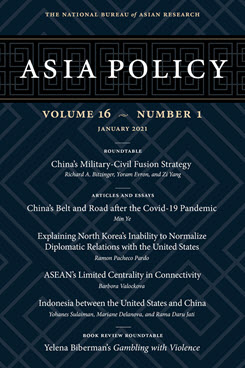Opening Up While Closing Up: Balancing China’s State Secrecy Needs and Military-Civil Fusion
This essay analyzes China’s state secrecy system and assesses its influence on the Military-Civil Fusion (MCF) strategy that aims to strengthen the defense industry.
EXECUTIVE SUMMARY
MAIN ARGUMENT
MCF seeks to reinvigorate China’s state-owned defense sector with nonstate inputs and integrate the defense economy with the nation’s overall economic development. As a result, greater transparency and sharing of information between state and nonstate MCF participants has occurred. As defense sector openness increases, a major concern for the Chinese government is the safekeeping of state secrets. The state secrecy system led by the Chinese Communist Party has jurisdiction over the whole of MCF, and stringent rules regulating nearly every level of the initiative have been instituted. Yet the rigidity of this system could hamper progress and impede the realization of MCF goals.
POLICY IMPLICATIONS
- China maintains an elaborate bureaucracy to safeguard state secrets. As the country’s security environment tightens, the secrecy system is positioned to gain additional influence over MCF.
- MCF has further opened up the state-dominated defense industry to nonstate actors, prompting greater transparency regarding the inner workings of China’s defense industry. This development could lead to a clearer understanding of emerging MCF industry leaders as well as Chinese defense enterprises’ interactions with nonstate partners that serve as the intermediaries of foreign engagement.
- State secrecy requirements add uncertainty to MCF’s future. As market forces demand additional information sharing, the state secrecy bureaucracy will likely oppose such needs. Ultimately, the Chinese government must decide whether to give precedence to market forces or security priorities.
Zi Yang is a PhD student in the S. Rajaratnam School of International Studies (RSIS) at Nanyang Technological University (Singapore). His research focuses on China’s military. Mr. Yang’s recent publications include a Center for Strategic and International Studies report with Jeff Benson titled “Party on the Bridge: Political Commissars in the Chinese Navy” (2020) and a Routledge Handbook chapter “Character Assassination and the Contemporary Anti-Corruption Campaign in the Chinese Military” (2019).
About Asia Policy
Asia Policy is a peer-reviewed scholarly journal presenting policy-relevant academic research on the Asia-Pacific that draws clear and concise conclusions useful to today’s policymakers. Asia Policy is published quarterly in January, April, July, and October and accepts submissions on a rolling basis. Learn more


